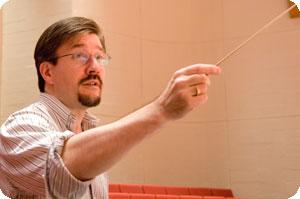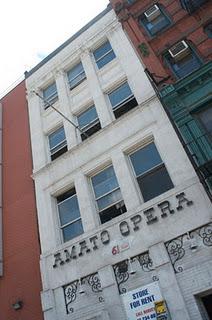
Christopher Fecteau, leader of the Dell'Arte Opera Ensemble.
Photo by Carl M. Jenks for CarlMJenksPhotography.com
"I spent most of three seasons as an assistant conductor and then associate music director at Amato." During that time, Mr. Fectau conducted more than a dozen staples of the repertoire. "My first performance as a conductor there was Madama Butterfly. I had conducted three full staging rehearsals (no time with the orchestra--the orchestra never rehearsed.) When I got to the theater for that particular Sunday matinee, I met the four principals backstage--only one of which I had rehearsed with. That's just the way it was done."
"As one might expect," he continues, "there were some nights that were magic, and others that were just maddening. Tony was a tough taskmaster. There was really only one way to do things: his way." He adds: "I slowly--and stubbornly--learned that his way was actually quite a fine way to do things. The consistency of that single-mindedness was oart if the glue that held productions together."

The Amato Opera after it closed in 2009.
Photo by Michael Maren.
According to Mr. Fecteau, an opera production could have six casts, three or four different conductors, a handful of different pianists and a chamber orchestra made up of faces that were always changing. The company had over 60 operas in its repertory during its run at 319 Bowery. The theater had only 107 seats.
"It was impossible not to learn there," he says. "In addition to Tony, my teachers were the numerous dedicated singers in principal roles on down through the chorus Plus, the pianists, orchestra musicians and people like Irene Kim, who managed to keep that strange big-little machine running."
Mr. Fecteau explains that the most direct inheritor of the Amato 'mantle' is Amore Opera. Amore, he says "inherited most of the costume and set stock of the 60-year-old company." Following in the footsteps of Amato and playing in small spaces in lower Manhattan, the Amore Opera just presented the New York stage premiere of I Due Figaro a non-Beaumarchais operatic sequel to The Barber of Seville and The Marriage of Figaro.
"The biggest lessons I learned, however, were not musical, but personal," he says. "Loyalty was Tony's absolute strongest suit. If you were good to him, to the company, to the people around him, he was good to you. In the long run, I no longer fit in at Amato, and Tony gave me a somewhat ungraceful shove out the door. I thank him for that, because it would have been difficult for me to leave that magical place in any other way."

